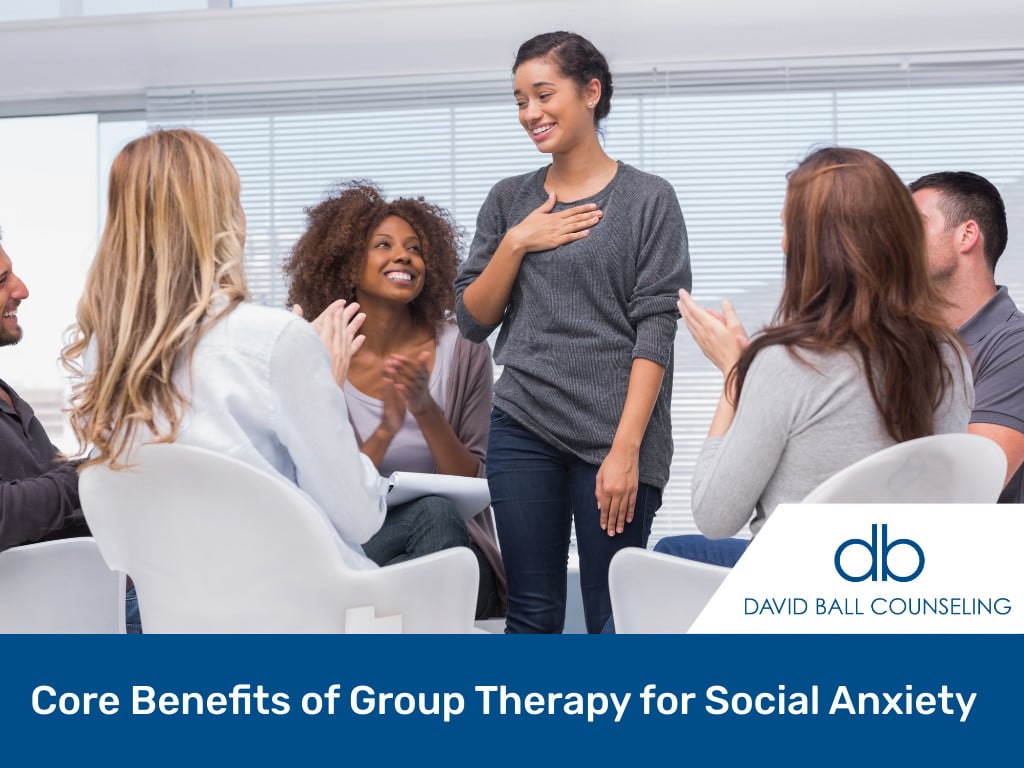Core Benefits of Group Therapy for Social Anxiety
Most of us experience some level of social anxiety. At times we can feel shy, frozen, afraid, or tentative in social situations. Social anxiety is normal. It can be nerve-racking to be in a situation where you must approach a group of people, interject in a conversation, or be in a place where you do not feel comfortable.
For some people, the intensity level of social anxiety can become incredibly disruptive and even problematic to their life. About 15.6% of the American population experiences social anxiety disorder, which is qualified as a mental health condition.
Group therapy for social anxiety is shown to be an effective treatment option for this challenge of intense disruptive social anxiety. People who experience overwhelming social anxiety usually have questions, such as:
· What exactly is a social anxiety disorder?
· How do you know if social anxiety is an issue?
· How does one learn to change or alleviate social anxiety?
· How does group therapy for social anxiety work?
· Should I see a therapist for social anxiety?
There are a lot of misunderstandings about social anxiety disorder and its treatments. In this post, we want to answer the common questions and offer guidance for the next steps.
What Is Social Anxiety Disorder?
First, it is important to clarify what a “mental health disorder” is in plain terms. A mental health disorder is nothing more than a categorized set of symptoms that match how people’s internal intensity shows up at times of stress. Mental health disorders are classified in the “Diagnostic and Statistical Manual of Mental Disorders” as a way to categorize mental, physical and emotional symptoms and better understand how to treat mental health challenges. A “disorder” is basically a group of unpleasant physical or emotional symptoms many people face that are lumped into a big, umbrella term called “disorder”. Lumping painful symptoms into groups (disorders) is a practical way to understand the human condition and create a set of best practices for practitioners to treat people with therapy or medication. If we think of the term “disorder” as nothing more than a group of symptoms a person is showing at a given time, it can help us understand and help that person.
When we are trying to understand intense social anxiety, it is important to understand how social anxiety disorder is classified.
According to the American Psychiatric Association, social anxiety disorder (also known as social phobia) is defined as severe anxiety when a person is afraid of embarrassment, humiliation, or rejection in social interactions. This is often triggered in situations where a person must speak in front of a group, meet new people, or when they are in social settings, such as a dinner party or social gathering situation.
Symptoms (How the Social Anxiety Shows Up)
Most people who deal with intense social anxiety may experience a variety of signs or symptoms of fear in social settings such as:
- Rapid heart rate
- Trouble forming thoughts and sentences
- Nausea or feeling sick to their stomach
- Increased sweating, particularly in the palms
- Increased self-consciousness, typically manifested in an inability to maintain eye contact or speaking softly and quietly
- Avoiding social settings or engaging in group activities and conversations
- Having a hard time meeting new people or developing relationships with others
- Panic attacks (trouble breathing, feeling lightheaded, fainting)
Many of us experience these symptoms from time to time, but if this anxiety has progressed to where it shows up intensely most of the time and feels unmanageable or persistent then you may need to consider taking steps for help. For some people, these symptoms may be mild and even unnoticeable. Other people have some patterns of anxiety that can cause them to feel powerless or out of control.
Causes (Some Reasons This Anxiety Could Show Up)
Social anxiety can be genetic; however, just because a person feels social fear does not guarantee that their child or other relatives will have it, too. Some scientists believe intense social anxiety can be passed down from generation to generation because the disorder is affected by hormonal imbalances in the brain that influence emotions – such as fear and anxiety.
An overactive amygdala in the brain structure can lead to increased anxiety, which can be a genetic trait. The amygdala is a part of the brain that deals with and processes emotions. Sometimes our emotional processors can become overactive at times.
Environmental situations can also cause a person to develop constant and unmanageable anxiety in social situations (social anxiety disorder). Usually, the environment where a person grew up or had early social experiences affects social and emotional reactions. Parental attachment and quality of relationship affects children and can create emotional challenges if needs are not met. Children who are bullied, abused, or experienced high levels of stress may develop intense forms of social fear that can be characterized as a social anxiety disorder.
Sometimes social anxiety can be brought on temporarily due to stressful situations, such as moving to a new city or starting a new job. Social or work demands can trigger symptoms, even if the person has never experienced this type of anxiety in the past.
Concerns or Challenges
People who deal with intense social anxiety where it is unmanageable enough to be considered social anxiety disorder often have trouble forming new relationships, whether professional, platonic, or romantic.
Social anxiety disorder can impact a person’s career, as they can have difficulty expressing themselves well during job interviews or meetings. Students with intense and recurring social anxiety may struggle to attend school, speak up to ask questions, or give public presentations in class, impacting their grades and learning capabilities.
Many people who are challenged with intense social anxiety experience symptoms of depression at some point – as social struggles can lead to feelings of isolation. At times of extreme social anxiety, people can become more reclusive and antisocial, or even develop agoraphobia or fears of leaving one’s home. There are many options to help social anxiety before it becomes overwhelming.
Treatment Options for Social Anxiety
Sometimes people can have chronic (long-lasting) mental health challenges. Other times our mental health challenges can come and go and never return. Whether short term or long term, there are treatment options shown to be effective at helping alleviate emotional turmoil. It is important to understand how to handle and manage these symptoms so we can gain confidence in navigating through our emotional waves of intensity. Thankfully, even the most extreme social anxiety disorders can be handled and controlled with the proper treatment.
Some Helpful Coping Methods
Taking actionable steps can help people learn to alleviate their anxiety if they start to experience symptoms. Being proactive and intentional can help slow ourselves down and rebalance our internal world.
One way to help ourselves when we feel social anxiety is to keep a journal. By expressing all of our thoughts and anxieties we can get a clearer picture of what we are afraid of. Self-expression can help alleviate some of the stress by getting it out of your head and putting it onto paper. It may also be useful to track what situations trigger these symptoms and scenarios that either alleviate or worsen these feelings.
In some cases, calming activities like breathing exercises, yoga, or meditation can alleviate anxiety. Learning to slow our minds and bodies down is a cornerstone of talk therapy and has incredible benefits if done in a consistent manner. Many mental health specialists also recommend incorporating positive activities into your life to manage stress – such as exercise, art projects, or gardening.
Finally, it may be best for some people with social anxiety intense enough to be labeled as social anxiety disorder to avoid substances like alcohol, drugs, nicotine, or even caffeine. These substances can potentially intensify physical sensations that can increase feelings of anxiety.
Possible Medication Options
Medications prescribed for mental health challenges/disorders are called “psychotropic medication”. This medication can be prescribed by a doctor or psychiatrist. There is a LOT of debate concerning psychotropic medication or whether or not to prescribe medication for mental health challenges. Research seems to indicate that people with moderate to severe mental health symptoms can benefit from psychotropic medicine and talk therapy. Taking medication is always the choice of the client and mental health practitioners should do their best to offer multiple options for alleviating symptoms that could possibly include both medical and non-medical interventions.
There are generally three types of medications used to treat this disorder: anti-anxiety meds, antidepressants, and beta-blockers. Medications work in different ways and clients need to work with their prescriber to manage possible side effects or symptoms that can occur by taking certain medications. Some medications help to balance hormones in the brain to diminish social anxiety symptoms, like increased heart rate, tremors, or sweating. Other medications can work to increase serotonin levels in a person’s brain that can gradually begin to decrease anxious feelings.
Keep in mind, if you are currently in counseling for social anxiety, you must be referred to a doctor or psychiatrist to receive medication. In my therapy sessions for anxiety, I do not take the route to medication lightly. We will discuss all possible outcomes in detail before referring you to a medical expert for medical guidance.
Group Therapy and Social Anxiety
Social anxiety group therapy can be extremely effective in helping people manage symptoms of anxiety. Group therapy involves meeting with a licensed counselor or professional to discuss their experiences, feelings, and find solutions along with a group of people who experience similar challenges.
What Is Group Therapy?
Group therapy is a form of psychotherapy that helps people better understand themselves and relate to other people. People will learn more about themselves and others in social situations in group therapy. Group feedback, connection, and honesty are helpful in alleviating social anxiety.
Speaking in front of a group (no matter how small) can be intimidating. But this type of group therapy is one of the best ways to overcome intense and recurring social anxiety (social anxiety disorder) – as it allows each person to “practice” and find solutions to their fears. Group work also helps people develop social skills and overcome anxieties as they communicate in a safe, controlled environment.
Group therapy is not only used to treat social anxiety disorder. It can be a viable treatment option for depression, eating disorders, substance abuse, and other emotional issues.
Group therapy is usually a consistent weekly meeting where people work together to form connections and relate with other people in healthy ways under the facilitation of one or two therapists. The duration of group therapy is never permanent and people do not go to therapy forever. I do recommend that once a client has tried group therapy for a session or two and feels somewhat comfortable they make a commitment of two months of weekly meetings to feel the full benefit of group work begin to show up.
How Group Therapy for Social Anxiety Works?
The purpose of group therapy for social anxiety disorder is to help people form new relational patterns and responses to situations that increase their anxiety in social situations. Often, counselors will help clients set problem-specific goals and check in to see their progress – usually on a monthly basis.
During group sessions, counselors will often ask leading questions to encourage discussion, connection, and social interaction amongst the group. People may volunteer to speak, or the therapist may ask a person to share. Conversations are always fluid and organic.
Some counselors will even help clients “practice” situations to work through their anxiety issues. This is known as exposure therapy. Group practice can progress to real-life situations over time as a person starts to learn to control their anxiety symptoms. Sometimes, two people in the group may be asked to “role play” themselves or other people to work through an upcoming situation, such as a business meeting or a first date.
Counselors will typically work to assess group members’ progress by checking in on clients’ lives outside the group. Typically after a month or two people will begin to see gradual shifts in social interactions or confidence. Social practice inside of group settings absolutely helps people gain confidence in their daily life, as group work helps people practice challenging social interactions in a safe environment.
Why Group Therapy Works?
Group therapy is focused on talking through problems to identify current social and relational patterns that build awareness and confidence. People with social anxiety disorder often assume the worst will happen, and they believe that others will judge, criticize, embarrass, or mock them. Instead of the worst happening, within-group therapy people can identify fear in relational and social settings and speak about it with the group. Group practice can help people interrupt social patterns of anxiety and replace them with coping strategies that help people relate and connect with others.
By practicing interactions with exposure therapy and learning ways to address fearful relational patterns, people can overcome their anxiety and feel more confident in social situations.
Going to a group with others who experience the same social anxiety challenges helps people realize they are not alone. This creates a supportive environment that allows people to open up and learn to become more comfortable in social situations.
Finding a Group Therapy Meeting for Social Anxiety
To find a counselor who offers group therapy, it is important to understand the qualifications that will be most helpful. You can use sites like the American Psychological Association or the Anxiety Disorders Association of America to find certified therapists for this type of treatment.
If you have insurance or Medicare/Medicaid, you should contact your provider to see which therapists are covered with your plan.
Do not feel like you have to be locked in with the first therapist you find.
Many people say that finding a counselor is a lot like dating; you need to give several people a try before you commit to one person. There may be a trial and error period until you find a group therapist who is a good fit.
Other Options
If you are unable to travel to a therapist’s office or are uncomfortable doing so, you may also consider online therapy options. Some counselors do offer remote group counseling sessions through video conferring. Online anxiety counseling is a great option for people who want to ease their way into group therapy before meeting in-person.
Conclusion
Intense and overwhelming social anxiety, also known as social anxiety disorder can be a crippling issue that holds people back from making meaningful connections and living their lives to the fullest. No matter how tough things seem, there is always hope. Group therapy can be an effective solution to help people overcome the challenge of social anxiety.
If you have experienced these symptoms and would like to speak with me about options, please reach out! I offer both in-person and virtual therapy services, depending on your needs and situation.
Simply fill out our online form to get started and submit any questions you have about therapy options and opportunities.




